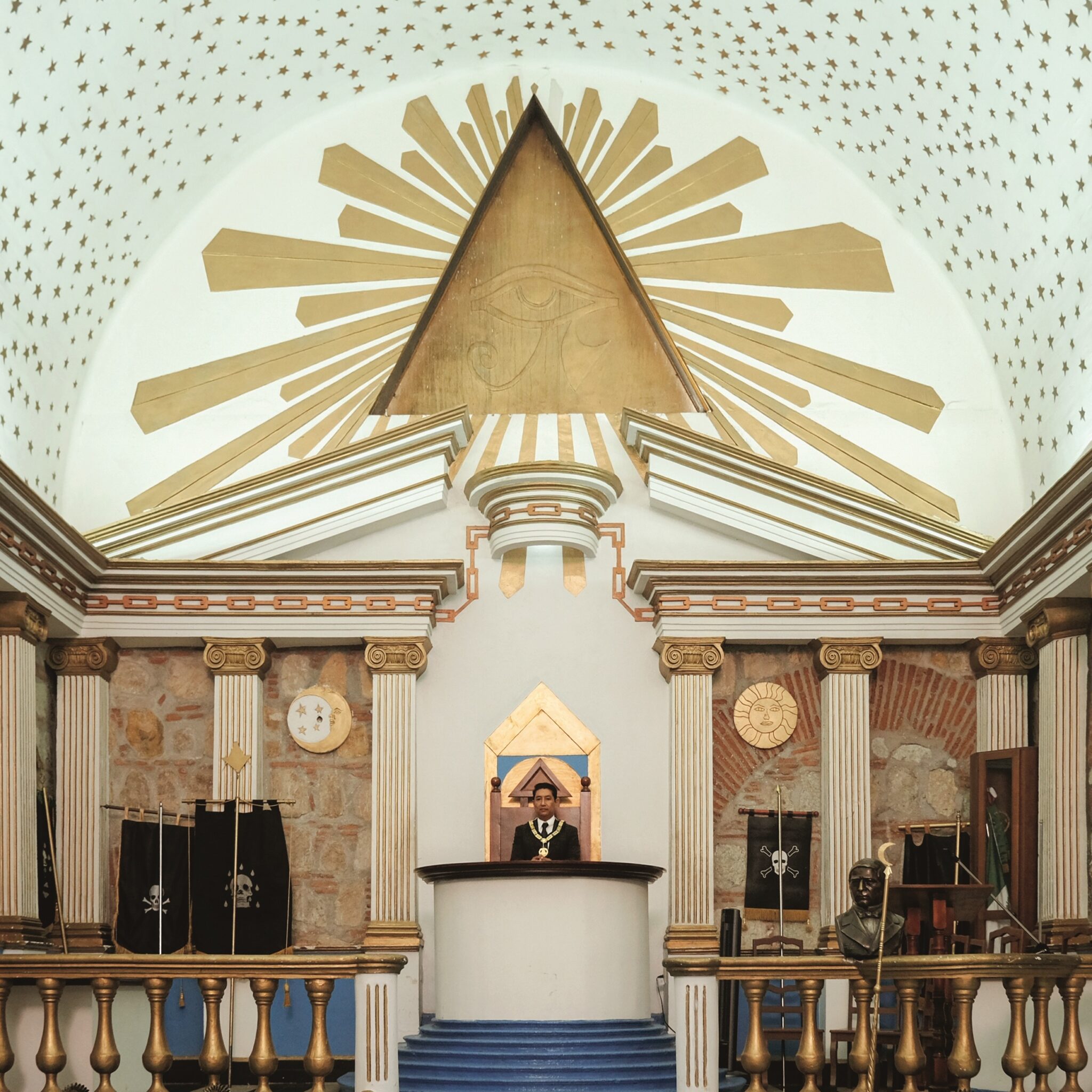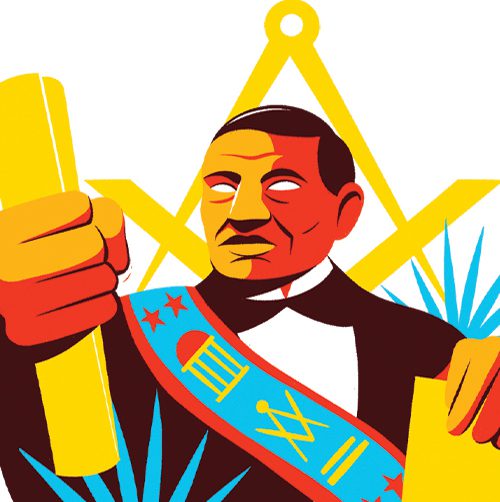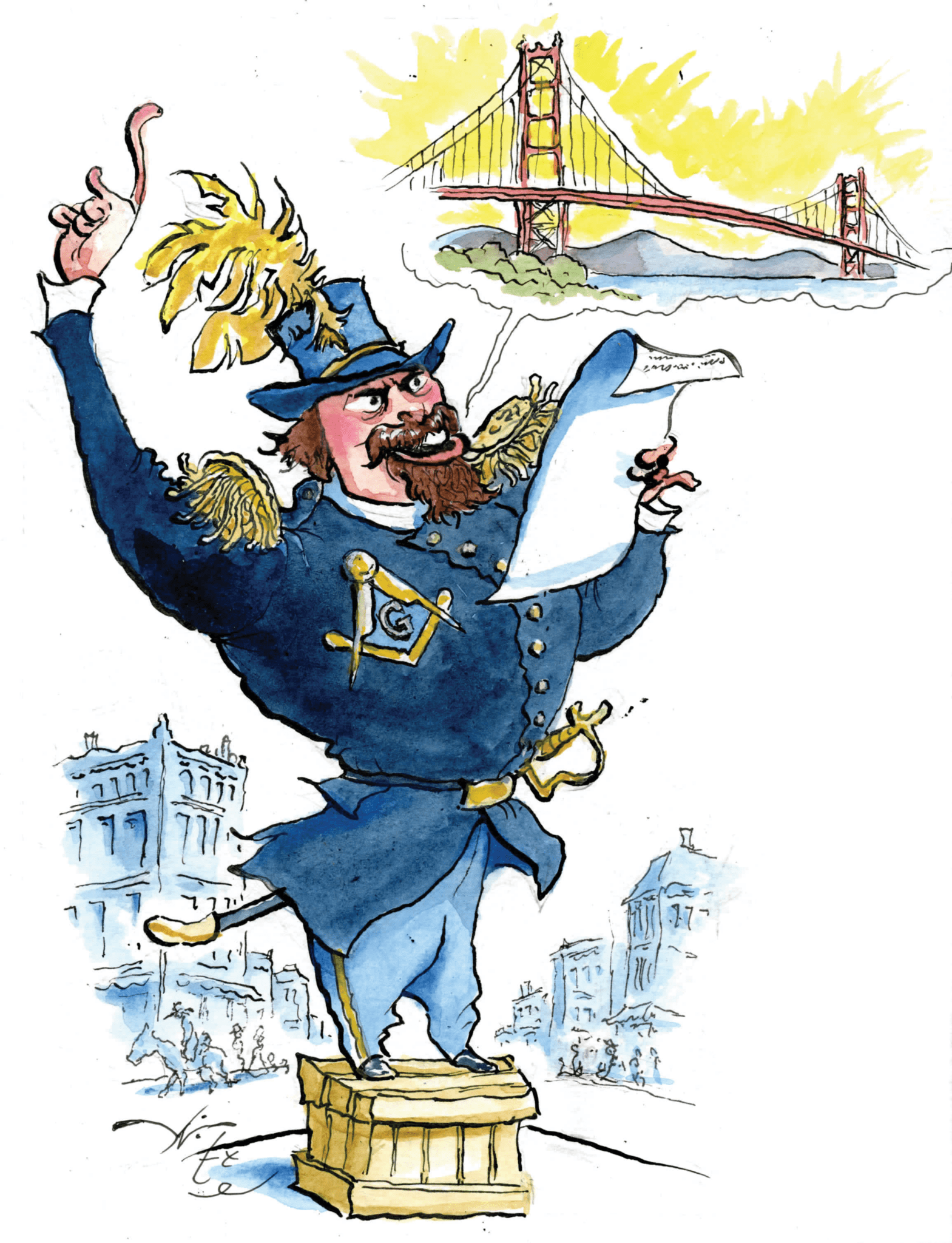
Neighbors, Friends, Hermanos: Freemasonry in Mexico Today
A history-spanning, forward-looking celebration of the fraternal and cultural connections between California and Mexican Freemasonry.
This August, a series of extraordinary events will unfold on a dusty expanse of desert in northwestern Nevada. In a matter of weeks, a town the size of Eureka, California, will be built from scratch. It will have its own power grid, temple, and ranger force. Its population will shoot from zero to 80,000—bigger than the city of Mountain View. And before it’s all torn back down again, the citizens of this overnight oasis will watch and cheer as a 75-foot wooden man is burned in effigy.
Burning Man is a spectacle in every sense. From its origins as a San Francisco artists’ bacchanal to today’s enormously complex festival, it has had a profound impact on virtually everyone who’s attended.
Revelers in various states of elaborate dress—or undress—converge on the playa each year to make, share, and explore impromptu art installations and generally expand their minds. Scorched by the sun and covered in dust, “burners” treat the event as a pilgrimage of sorts. Burning Man, they says, is an opportunity to immerse themselves in an environment far beyond their everyday lives.
And for the small group of California Masons who make the trek to Black Rock Desert, the echoes between Burning Man and Freemasonry are unmistakable.
“People who attend Burning Man or are involved in Masonry are trying to better themselves or learn something at a higher level,” says Kevin Jones, a member of Logos № 861 in San Francisco and a self-professed burner. “Some people just want to party, but most are there for a much bigger purpose.” Participants in both scenes are, he adds, “misunderstood in some ways.”
Once you get past Burning Man’s countercultural trappings, the similarities to Freemasonry become apparent. Beyond the strange and mystical customs, both are about seeking out a higher meaning. For Nick Angelis, the things that drew him to his first Burning Man in 2009 called him to join Masonry the following year. “I wouldn’t be the person I am today if not for Burning Man and for Masonry,” says Angelis, a member of Oceanside-San Dieguito № 381.
Both Burning Man and Masonry offer an opportunity to enter a new dimension. That’s typified by the Masonic custom of referring to the lodge as a “sublime” space and the world outside as “profane.” Carson Duper, a member of Pacific-Starr King № 136 who was involved in Burning Man’s early years, recalls stepping over a line drawn in the sand as he arrived onsite. “You’re entering a sacred space now,” he was advised.
A commitment to living up to one’s highest ideals is also baked into the ethos of both Burning Man and Freemasonry. The ten principles of Burning Man, espoused by the event’s original organizers, include things like radical inclusion, the idea that any and all are welcome to join. For the small band of Mason-burners, such principles have direct parallels in Freemasonry.
Then there’s the emphasis on ritual. At Burning Man, participants have developed all sorts of symbolic gestures. One of the most powerful involves placing mementos inside a wooden temple before it and the man are burned to the ground. When they’re set aflame, the tokens—and whatever they represent—disappear forever. “It’s about discarding something from your life and getting rid of it from your psyche,” Duper says.
“The catharsis of burning the man as a community every year is very deep and very spiritual.”
Above:
The design of Black Rock City, the pop-up community in the Nevada desert that hosts Burning Man, is based on sacred geometry: a crossroads within a circle within a pentagon.
That allusion to shared community is particularly important. More than the elaborate rituals and costumes, the clearest connection Duper sees between Burning Man and Freemasonry is their ability to form tight-knit groups. “In a way, it’s just an excuse for a community to gather itself around,” he says.
Following a gathering in the “multiverse” in 2020 and an unauthorized, renegade conclave last year, Burning Man is back for 2022. Several Mason-burners say they hope the old spirit of the event remains.
And for those thinking of venturing into the desert for the first time, Angelis offers this: “Just like with Masonry, with Burning Man it’s like a choose-your-own-adventure book. There’s everything for everybody.” No matter what, Angelis says, “You’re going to have an eye-opening experience.”
Above:
The elaborate temple is eventually burned down, along with all the mementos people leave in it. Photo by Kevin Jones.
PHOTOGRAPH BY
BLM; Floor/CC

A history-spanning, forward-looking celebration of the fraternal and cultural connections between California and Mexican Freemasonry.

In the revolutionary movements of Latin America, Central America, and South America, Freemasons were front and center.

150 years after he first proposed the San Francisco Bay Bridge, the legendary eccentric and Freemason Emperor Norton may finally get his due.